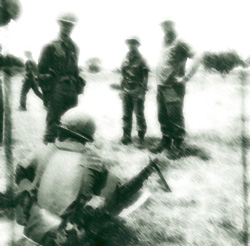South Vietnam — 1968
Clack went the shutter on my camera. The two South Vietnamese soldiers looked at one another, nodded and stepped back from the edge of the bomb crater. One pulled a cigarette from a pack in his breast pocket and lighted it. He offered one to his comrade, who shook his head and turned to look across the rice paddies toward the high ground, where a network of trees drew clean, black lines against the yellow sky.
A hand squeezed my shoulder, and I looked up. The company commander tapped my camera with his finger and whispered, “Take any pictures?”
“No, Sir.” I lied.
He nodded and continued on to check the next guy with a camera.
I looked back at the two soldiers. They were engaged in a conversation; the smoker’s hand rested on his comrade’s shoulder.
Virginia — 1993
Twenty-five years later, sitting at the kitchen table, a half-finished bowl of oatmeal in front of me, I stare at the curling, color snapshot that fell from between the pages of my off-and-on Vietnam diary. I’d forgotten all about it. It’s as much a silent open mouth now as it was when I denied taking it — the image of the absence of truth.
The day I took the picture wasn’t really sunny, just brighter than usual with fewer clouds. The tilted horizon reveals less of the rice paddies than I remember. But the yellow sky and black tree line on the hill beyond the bomb crater are as clear as they were that day. Several American soldiers in the foreground are frozen in the spots they occupied at that moment. There’s Red Pomeroy, for example. He sits on his duffle bag staring into his helmet like he’s about to vomit. But what you can’t see is he has taped a picture of his wife inside. A couple of days later, he took a sniper round through that helmet and never looked at her again. Two South Vietnamese soldiers stand close to the crater’s edge, rifles raised — not as clearly focused as I remember.
I lift my gaze and look out the window. Sun warms my face. Across the yard my neighbor and his wife sit on their front deck in identical aluminum folding chairs with green and white plastic mesh. It’s been a day since their accident. They’d gone out to dinner with their granddaughter. On the way home, the husband had swerved the SUV to avoid an oncoming car. He missed the collision but rolled his vehicle into a ditch. It was over before they knew it. Seconds after they stopped rolling, the little girl called from the back seat, “What happened, grandpa?” Their faces and arms were bruised, that’s all.
Whispers and phone calls spread news of the accident around the neighborhood. Someone came by to pick up the granddaughter. Now the bruised grandparents sit in the sunshine overlooking their yard. All morning, neighbors interrupt their walks and step carefully across the grass to where the couple sits. Most don’t climb the stairs to the deck. Instead they stand on the grass below the couple and reach a hand up to touch a shoe or tug a trouser leg while they exchange a few words. Then they turn and walk slowly away shaking their heads.
While one neighbor tiptoes back to the street the injured man slips out of his chair to kneel beside his wife. He looks into her face, smooths her hair and draws the backs of his fingers across her purple cheek. His lips move and she nods slightly, as if it hurts. Then, in full view of the neighbors, he reaches over, kisses her hand and covers her fingers with his.
I look back at my photograph. And even if you examine it carefully, you’ll miss the most important part of the picture. What you can’t see is the old woman, the man and the 4-year-old, suspected spies, lying one on top of the other at the bottom of the bomb crater.
I had been sighting through the camera to shoot the tree line against the sky when the sound of that first gunshot paralyzed my finger. Then a screech like some kind of bird, but from a time before birds, rose from the crater. The soldiers fired twice more, then silence. My shutter clacked and broke that silence.
Then the soldiers turned and stepped back from the crater. One placed a hand on the other’s shoulder while gesturing toward the growing rice and the high ground beyond as if explaining something to his friend. Perhaps he suggested how simple life might be if everything was as clear as the lines those trees drew against the sky that day; if bullets served only as gentle reminders reaching out randomly to tap our shoulders, faces or arms like you might touch a sleepwalker or an injured person.
About Louis M. Abbey
Louis M. Abbey is a retired professor of Oral and Maxillofacial Pathology from Virginia Commonwealth University in Richmond, Virginia. He has an MFA in Creative Writing from VCU. His fiction has appeared in Indiana Review, The MacGuffin, Hayden’s Ferry Review, Georgetown Review, among others and online in Grey Sparrow and three times in Toasted Cheese. One of his poems was anthologized in Blood and Bone, Poems by Physicians, Angela Belli & Jack Coulehan, Eds. (U. Iowa Press, 1998). He served in Vietnam from 1968-1969. He lives and writes in Revere, Massachusetts.



Powerful. Such a strong reminder of the things we often don’t “see” that can be brought into our memory vision by a photo, a smell or words.
Greeen and white aluminum folding chairs..I can feel the porch att he beach house so many years ago..but I couldn’t have told you that’s where I sat without that trigger.